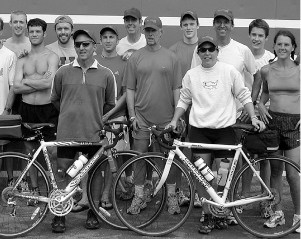Barry Wald '78 was diagnosed with Steinert's Disease, a rare form of muscular dystrophy (MD), 13 years ago. Because of the muscle deterioration MD causes, Wald can no longer run, but he can still bike. On June 23, the Newton Center, Massachusetts, native arrived in Fenway Park after cycling cross-country from his current home in Portland, Oregon. Following him onto the field came his sister, Liz Wald '89, and Run America, a group of runners who made the 30-day trip with them and raised $200,000 for MD treatment and prevention.
 |
| Standing behind their bicycles, siblings Barry Wald '78 (left) and Liz Wald '89 pose with some of their Run America teammates in front of Fenway Park's famous "Green Monster" after covering more than 3,000 miles in 30 days. |
| Ellenor J. Honig |
Some of the 150 friends and supporters gathered at Fenway to celebrate the group's arrival joined in for the last lega lap around the Red Sox playing field. Wald's Eliot House roommates David Boghossian and Tom Johnson were there; Johnson tracked the group, posting updates on the team's website (www.runamerica.org), and helped organize the Fenway event. "It has been a lifelong dream of Barry's to get to Fenway. We've been fans of the Red Sox forever," said Johnson. "All of us are glad to have this chance to support him."
Wald's high-school friend, fellow cyclist, and runner Craig Johnston, who also lives in Portland now, came up with the idea of a cross-country fundraising trip and recruited Run America, the core group of six who ran, relay style, from Oregon to Massachussetts while Wald biked. Wald asked his sister if she would bike with him, keeping him company while the others ran. "Fantastic! I'll learn how to ride long-distance," Liz Wald recalled thinking. In fact, she said, "It was 30 incredible days. We're 10 years apart, so, growing up, we were always at very different stages in our lives. It was absolutely wonderful to share this opportunity with Barry."
The two of them biked throughout the day while the six core runners alternated shifts, each averaging 60 miles a week and, collectively, covering all 3,350 miles. Another 40 to 50 runnersincluding some of Wald's high-school and college friendsjoined in for stages of the route; Tony Green '78 started in upstate New York and finished in Fenway Park, running in the mornings and biking with the Walds in the afternoons. Two vans picked up tired relayers and dropped off fresh runners.
"The trip was spectacular," Wald declared. "Having special people in my life join me and the group was amazing. There was a wonderful cohesiveness." Above all, Wald now has more confidence in his abilities. "I commute to work," he said, "and I've participated in cycling expeditions, but I had never done something on this level. One of the worst aspects of this disease is not knowing exactly what the future holds. I wasn't sure I could do it." After 10 states, 30 days, and more than 3,000 miles, he has changed his mind.





